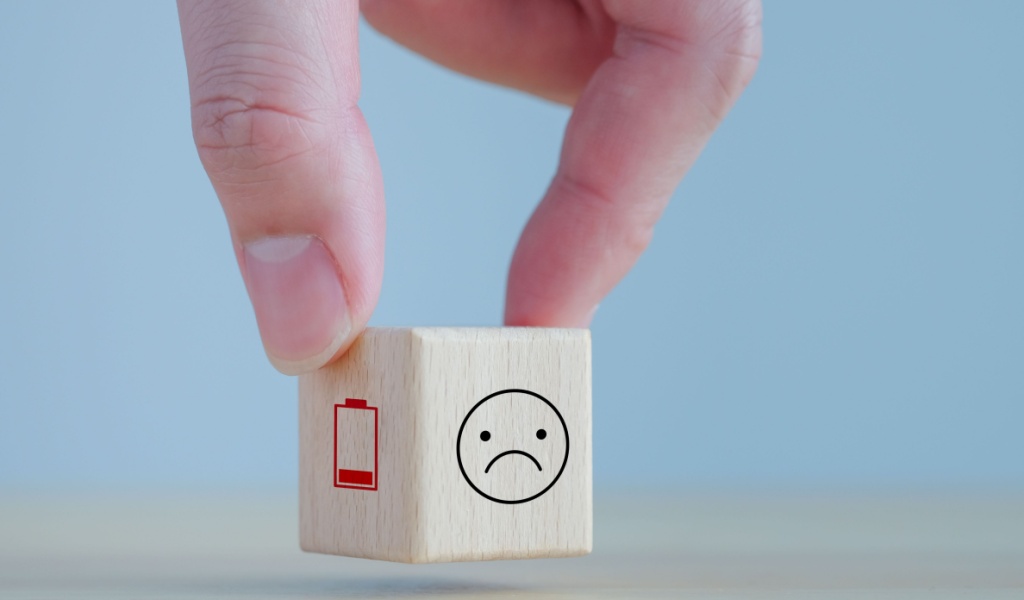Burnout is more than just feeling exhausted. It’s a serious disorder that can lower physical and emotional energy, influencing overall health and productivity. It’s frequently dismissed as stress or a busy period, but it can have long-term effects if not addressed. So, how can you find out if you’re on the verge of burnout? The following are the key indicators you need to look out for.

An Increase In Irritability And Frustration
If you yell at people more frequently or feel continuously irritable, it can be a symptom of burnout. According to Nuffield Health, burnout can make even trivial problems look overbearing, resulting in mood swings and frustration. A lack of endurance and emotional control is also common since burnout reduces mental and emotional energy, making you more vulnerable to rage or grief.
Persistent Chronic Fatigue
Feeling continuously exhausted despite adequate rest could be an indicator of burnout. In contrast to habitual tiredness, which can be improved by sleep, burnout-related exhaustion doesn’t go away, making it challenging to concentrate or function. According to VeryWell Mind, burnout and tiredness feel deep, disturbing both your mind and body. This results in constant exhaustion, as no amount of rest helps you!
Feeling Lonely Or Isolated
Another symptom of burnout is an increasing sense of loneliness. As your emotional energy wanes, you may distance yourself from friends, family, or coworkers. This feeling of loneliness can worsen the emotional toll of burnout, making it difficult to ask for assistance or support. If you’re avoiding social interactions or feeling like no one can relate to your struggles, burnout can be the reason.
Trouble Focusing
Burnout can make concentrating on tasks feel like a massive challenge. This mental haze may result in work blunders, forgetfulness, and trouble staying organized. If you’re finding it challenging to organize your thoughts or you lose attention very soon, it indicates that burnout is disturbing your mental clarity.
Cynicism and Pessimistic Perspective
Burnout alters one’s view of life, one’s job, and one’s relationships. If one becomes increasingly cynical or pessimistic about one’s work, future, or life in general, it’s another indication that burnout may be approaching.
Harmful Coping Strategies
While trying to handle burnout, some people turn to harmful coping strategies to ease the mental and physical toll. These may include going overboard with food, liquor, or even too much screen time.

Physical Symptoms
Burnout isn’t only about your emotional state; it can also manifest physically. According to Nuffield Health, physical symptoms such as muscle tension, headaches, stomach problems, and even heart palpitations can be associated with burnout. It’s your body’s way of communicating an issue.
Sleep issues are another physical side effect of burnout. You may have trouble falling asleep or wake up feeling drained regardless of how many hours you spend in bed. Sleep troubles are an outcome of mental tiredness.
Not Feeling Involved or Content
You may be crossing tasks off the list without feeling purpose or contentment. Burnout can make everything feel robotic and dull, stealing you from the pleasure you used to get earlier in your regular activities. If you’re not feeling involved in your life or job anymore, it’s time to stand back and assess your mental health.
Drop In Efficiency and Productivity
If your efficiency and productivity are decreasing despite your best efforts, burnout might be the root cause. As burnout expands, your capacity to perform at your usual level reduces, making even everyday tasks feel tiresome and hampering your ability to complete daily chores.
Lack of Enthusiasm
Once a go-getter, now finding it challenging even to begin a project, burnout can strip away your motivation and determination to achieve things, no matter how essential they are. This isn’t just procrastination; it’s a persistent lack of energy that makes even minor tasks impossible.
Feeling Disconnected or Detached From Work
A lack of interest in work or social activities can be a significant symptom of burnout. Individuals who are burned out frequently start to detach themselves from their colleagues, work obligations, and even friends and family. If you used to enjoy your job or hobbies but now find them draining or worthless, burnout might be catching up on you.
How To Manage Burnout?
Identifying the symptoms of burnout is the first stage of recovery. Once you identify the signs, you must act fast before burnout worsens. Begin by setting limits at work and getting involved in self-care, whether through relaxation methods such as mindfulness or engaging in activities that assist you to refresh.
Seeking professional assistance, like therapy or counseling, can also help wrangle the emotional toll. Speaking to a loyal friend or family member can also provide support and make you feel less lonely.
Burnout is a serious condition, but with the correct techniques, it’s possible to bounce back and regain a sense of balance. Don’t overlook the symptoms; maintaining your intellectual and physical well-being should always be your top priority.
Remember that you’re not alone in this; getting help is the first step toward recovery!



